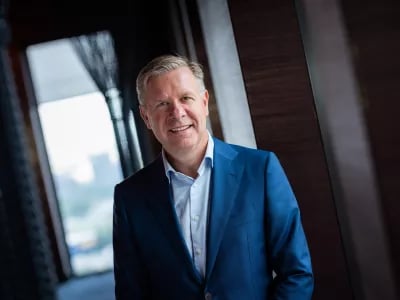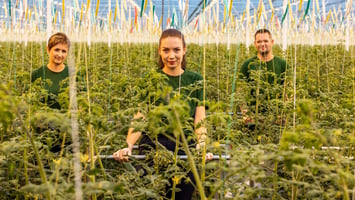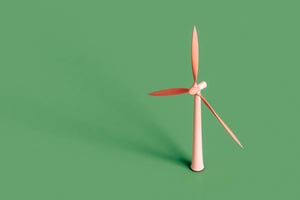Groendus is the name of a new integrated energy company for the corporate market. Five specialised companies joined forces to form this innovative company that generates its own sustainable energy, implements smart savings for clients, and facilitates direct electricity purchasing and sales. With this mix of services, Groendus helps businesses transition to 100% clean energy. CEO René Raaijmakers told us about frozen meat snacks as batteries and the much-needed transition from a demand-driven to a supply-driven energy market.
It may well be the single biggest challenge of the sustainable energy transition: the fact that clean power is weather-dependent, and therefore volatile. However much solar and wind energy we might generate, there will always be times when there is a mismatch between supply and demand. As a result, we are still dependent on fossil fuels at times when clean energy is simply not available. The need to solve this problem for the long-term is becoming increasingly evident: present-day electricity grids are already struggling to manage the imbalance between production and consumption, while companies are facing growing pressure from the market and stakeholders to make their energy consumption as sustainable as possible.
The good news is that the problem can be at least partially solved by focusing on simultaneity: using energy as much as possible precisely when it is generated, and minimising consumption at times when the supply is low. Unfortunately, major consumers of energy have not yet adjusted their perspectives: they've gotten used to an unlimited supply of energy, regardless of demand.
"The current market is demand-driven," said René Raaijmakers, who has recently taken the CEO position at Groendus (a fusion of the former Rooftop Energy, Greenspread, Solaris Industria, CT Energy and Ealyze). "While what we need is a market that is supply-driven. And that's exactly what we want to do with Groendus: to create a sustainable energy market in which supply can fluctuate, and we help companies anticipate that and adjust their demand accordingly."
Energy marketplace
Clients of Groendus develop an integrated understanding of sustainable energy consumption. That starts with power generation, because many businesses have plenty of opportunities to generate their own power, e.g. by putting solar panels on their roofs or installing a wind turbine. Groendus invests in, develops, and manages production capacity for its clients. This 'home-grown' sustainable electricity can be used by the client itself, but whenever a surplus arises, this can be sold on the Groendus 'energy marketplace'. Every hour, local consumers and producers are matched, and energy is delivered and settled directly in a transparent way, without the involvement of traditional energy suppliers.
Even more interesting is how Groendus helps its clients analyse consumption and energy needs on an hourly basis. "That stimulates our clients to explore how they can store energy when there is oversupply and reduce their energy consumption when there is a shortage," Raaijmakers explained. Because this often requires adjustments to business processes, companies tend to need some time to get used to the idea. But according to Raaijmakers, there are many different possibilities. "Consider a food producer with a lot of cold stores. You could easily cool them from minus 18 to minus 22 degrees when the supply is high, and gradually let it warm back to minus 18 degrees when supply is low. Just like that, a frozen meat snack can be turned into a very interesting battery. Swimming pools are another potential site for energy storage, and regional water authorities can proactively start pumping when rain is expected. What matters is having enough predictability in your process and environmental conditions to allow more flexibility in your energy consumption.
Energy communities
Raaijmakers emphasises that working with Groendus doesn't mean they have to shift to an entirely new model overnight. "We're going to add intelligence to business processes, but we do that step by step, together with the client. This is a transition, and you have to go about it gradually. Clients who already have a long-term fixed energy contract can initially simply use our platform in parallel. That way, they can see for themselves how much they might have been able to save by making their energy needs more variable. After all, the energy on our platform is directly and locally generated, and the big traditional energy producers don't take a cut."
Groendus's integrated approach also enables new business propositions. Because businesses can generate their own green power as well as purchase it cheaply on the marketplace, it becomes possible, for example, to sell energy-consuming products including the requisite power. As Raaijmakers explains it: "A producer of greenhouses in the Westland won't just sell a greenhouse, but they'll sell a greenhouse alongside green electricity that they generated themselves. You could also think of entire production chains or industry collectives: ten hospitals that generate electricity as a group and share it among themselves. We expect all sorts of innovative energy communities to emerge."
Groendus already counts major retailers like Coolblue, Picnic and Suitsupply among its clients, as well as various financial institutions and health care providers like Heeren Loo. The latter now generates 80% of their energy needs locally, sustainably and simultaneously, said Raaijmakers. “And the best part is: the longer a business remains our client, the better we get to know their needs and the better we're able to predict their peak energy consumption. 80% is already quite impressive, but the next challenge is to work together with the client to see if we can get to 90% or 95% matching through local green power generation. That way, organisations don't just become sustainable on paper, as is now often the case with GOs [editor's note: Guarantees of Origin, documents that evidence the source of sustainably produced electricity], but you achieve real, material sustainability. And that's where we need to be headed."
Read more about the investment Groendus













